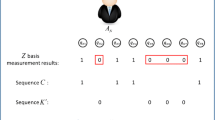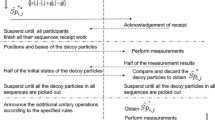Abstract
Zhou et al. (Int. J. Theor. Phys. 59, 663-676 2020) introduced a three-party semi-quantum key agreement protocol utilizing four-qubit cluster states. However, we found it has security vulnerabilities, quantum resource wastage, and limitations on the number of participants. To address these concerns, we propose an improved protocol using GHZ-like states, which can resist double C-Not attack and conserve quantum resources. Additionally, we extend the improved scheme to multiparty key agreement in circle-type, which offers high efficiency and is well-suited for flexible dynamic networks.














Similar content being viewed by others
Data availability statement
All data, models, and code generated or used during the study appear in the submitted article.
References
Bennett, C.H., Brassard, G.: An update on quantum cryptography. Paper presented at the advances in cryptology: Proceedings of CRYPTO 84 4, Springer Berlin Heidelberg, (1985)
Ekert, A.K.: Quantum cryptography based on Bell’s theorem. Phys. Rev. Lett. 67(6), 661 (1991)
Bennett, C.H., Brassard, G., Mermin, N.D.: Quantum cryptography without Bell’s theorem. Phys. Rev. Lett. 68(5), 557 (1992)
Chen, L.-Q., et al.: A quantum key distribution routing scheme for hybrid-trusted QKD network system. Quant. Inform. Process. 22(1), 75 (2023)
Ye, C.-Q., et al.: Circular mediated semi-quantum key distribution. Quant. Inform. Process. 22(4), 170 (2023)
Hillery, M., Bužek, V., Berthiaume, A.: Quantum secret sharing. Phys. Rev. A 59(3), 1829 (1999)
Yang, Y., Wen, Q.: Threshold quantum secret sharing between multi-party and multi-party. Sci. China Ser. G: Phys. Mechan. Astron. 51(9), 1308–1315 (2008)
Wang, Y., et al.: Verifiable multi-dimensional (t, n) threshold quantum secret sharing based on quantum walk. Int. J. Theoret. Phys. 61(2), 24 (2022)
Long, G.-L., et al.: Quantum secure direct communication and deterministic secure quantum communication. Front. Phys. China 2, 251–272 (2007)
Wang, C., et al.: Quantum secure direct communication with high-dimension quantum superdense coding. Phys. Rev. A 71(4), 044305 (2005)
Cao, Z., et al.: Realization of quantum secure direct communication with continuous variable. Research 6, 0193 (2023)
Dušek, M., et al.: Quantum identification system. Phys. Rev. A 60(1), 149 (1999)
Hong, C., et al.: Quantum identity authentication with single photon. Quant. Inform. Process. 16, 1–20 (2017)
Rao, B.D., Jayaraman, R.: A novel quantum identity authentication protocol without entanglement and preserving pre-shared key information. Quant. Inform. Process. 22(2), 92 (2023)
Mitchell, C.J., Ward, M., Wilson, P.: Key control in key agreement protocols. Electron. Lett. 34(10), 980–980 (1998)
Ateniese, G., Steiner, M., Tsudik, G.: New multiparty authentication services and key agreement protocols. IEEE J. Sel. Areas Commun. 18(4), 628–639 (2000)
Zhou, N., Zeng, G., Xiong, J.: Quantum key agreement protocol. Electron. Lett. 40(18), 1 (2004)
Hsueh, C.C., Chen, C.Y.: Quantum key agreement protocol with maximally entangled states. Paper presented at the proceedings of the 14th information security conference (ISC 2004), National Taiwan University of Science and Technology, Taipei, (2004)
Chong, S.-K., Tsai, C.-W., Hwang, T.: Improvement on ‘quantum key agreement protocol with maximally entangled states’. Int. J. Theoret. Phys. 50, 1793–1802 (2011)
Zhu, Z.-C., Hu, A.-Q., Fu, A.-M.: Participant attack on three-party quantum key agreement with two-photon entanglement. Int. J. Theoret. Phys. 55, 55–61 (2016)
Chong, S.-K., Hwang, T.: Quantum key agreement protocol based on BB84. Opt. Commun. 283(6), 1192–1195 (2010)
Shen, D.-S., Ma, W.-P., Wang, L.-l.: Two-party quantum key agreement with four-qubit cluster states. Quant. Inform. Process. 13, 2313–2324 (2014)
Yang, Y.-G., et al.: New quantum key agreement protocols based on cluster states. Quant. Inform. Process. 18, 1–17 (2019)
Shi, R.-H., Zhong, H.: Multi-party quantum key agreement with bell states and bell measurements. Quant. Inform. Process. 12, 921–932 (2013)
Liu, B., et al.: Multiparty quantum key agreement with single particles. Quant. Inform. Process. 12, 1797–1805 (2013)
Xu, G.-B., et al.: Novel multiparty quantum key agreement protocol with GHZ states. Quant. Inform. Process. 13, 2587–2594 (2014)
Gu, J., Hwang, T.: Improvement of ‘Novel multiparty quantum key agreement protocol with GHZ states’. Int. J. Theoret. Phys. 56, 3108–3116 (2017)
Min, S.-Q., Chen, H.-Y., Gong, L.-H.: Novel multi-party quantum key agreement protocol with G-Like states and Bell states. Int. J. Theoret. Phys. 57, 1811–1822 (2018)
Sun, Z., et al.: Improvements on ‘multiparty quantum key agreement with single particles’. Quant. Inform. Process. 12, 3411–3420 (2013)
Sun, Z., et al.: New fair multiparty quantum key agreement secure against collusive attacks. Sci. Rep. 9(1), 17177 (2019)
Sun, Z., et al.: Efficient multiparty quantum key agreement with a single \(d \)-level quantum system secure against collusive attack. IEEE Access 7, 102377–102385 (2019)
Sihare, S.R.: Multi-party quantum key agreement protocol for detection of collusive attacks in each sub-circle segment by headers. Int. J. Theoret. Phys. 61(7), 208 (2022)
Lin, S., et al.: Multiparty quantum key agreement. Phys. Rev. A 104(4), 042421 (2021)
Liu, W.-J., et al.: Multi-party semi-quantum key agreement with delegating quantum computation. Int. J. Theoret. Phys. 56, 3164–3174 (2017)
Shukla, C., Thapliyal, K., Pathak, A.: Semi-quantum communication: protocols for key agreement, controlled secure direct communication and dialogue. Quant. Inform. Process. 16, 1–19 (2017)
Yan, L., Zhang, S., Chang, Y., et al.: Semi-quantum key agreement and private comparison protocols using Bell states. Int. J. Theoret. Phys. 58, 3852–3862 (2019)
Zhou, N.-R., Zhu, K.-N., Wang, Y.-Q.: Three-party semi-quantum key agreement protocol. Int. J. Theoret. Phys. 59, 663–676 (2020)
Xu, T.-J., et al.: Single-state multi-party semi-quantum key agreement protocol based on multi-particle GHZ entangled states. Quant. Inform. Process. 21(7), 266 (2022)
Liu, C., et al.: New semi-quantum key agreement protocol based on the \(\chi \)-type entanglement states. Int. J. Theoret. Phys. 61(3), 60 (2022)
Zhou, N.-R., Liao, Q., Zou, X.-F.: Multi-party semi-quantum key agreement protocol based on the four-qubit cluster states. Int. J. Theoret. Phys. 61(4), 114 (2022)
Boyer, M., Kenigsberg, D., Mor, T.: Quantum key distribution with classical Bob. Paper presented at the 2007 first international conference on quantum, nano, and micro technologies (ICQNM’07), (2007)
Gu, J., Hwang, T.: Double C-NOT attack on a single-state semi-quantum key distribution protocol and its improvement. Electronics 11(16), 2522 (2022)
Cabello, A.: Quantum key distribution in the Holevo limit. Phys. Rev. Lett. 85(26), 5635 (2000)
Acknowledgements
This work was supported by Project of Natural Science Foundation of Hunan Province (2021JJ30454), Scientific research Project of Education Department of Hunan Province (22A0049, 22B0699).
Author information
Authors and Affiliations
Corresponding author
Ethics declarations
Conflict of Interest
The authors declare that they have no conflicts of interest.
Additional information
Publisher's Note
Springer Nature remains neutral with regard to jurisdictional claims in published maps and institutional affiliations.
Rights and permissions
Springer Nature or its licensor (e.g. a society or other partner) holds exclusive rights to this article under a publishing agreement with the author(s) or other rightsholder(s); author self-archiving of the accepted manuscript version of this article is solely governed by the terms of such publishing agreement and applicable law.
About this article
Cite this article
Xu, X., Lou, X. Improvement and Flexible Multiparty Extension of Semi-Quantum Key Agreement Protocol. Int J Theor Phys 62, 252 (2023). https://doi.org/10.1007/s10773-023-05504-8
Received:
Accepted:
Published:
DOI: https://doi.org/10.1007/s10773-023-05504-8




